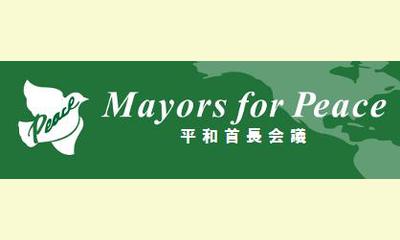|
|
The Hiroshima Appeal
un articulo por Mayors for Peace
We, representatives of 5,712 cities from 157
countries/regions around the world, have met at
the 8th General Conference of Mayors for Peace
held in Hiroshima [August 2013] and engaged in
extensive discussions on the theme 'Toward a World
without Nuclear Weapons—Conveying the "Spirit of
Hiroshima and Nagasaki" to the World.'

click on photo to enlarge
In August 1945, the cities of Hiroshima and
Nagasaki were reduced to ruins, in both cases by a
single atomic bomb, and more than 210,000 people
from the two cities lost their precious lives. The
suffering of the atomic bomb survivors—known as
hibakusha—from the blast, heat and radiation
continues to this day, 68 years later. Having
lived through an experience too cruel to be put
into words, the atomic bomb survivors have
continued to appeal for nuclear abolition and to
extend their desire for peace to the people of the
world. Their dedication stems from their deep
humanitarian conviction that "no one should ever
again suffer as we have."
Mayors for Peace, which feels a strong sense of
responsibility to guarantee the safety and welfare
of citizens everywhere, empathizes profoundly with
the spirit of Hiroshima and Nagasaki in striving
for nuclear abolition and peace, and is
intensifying its activities to promote the
abolition of nuclear weapons by 2020.
"Hiroshima" and "Nagasaki" are names that are now
well known throughout the world. However, those
states that possess nuclear weapons have turned a
deaf ear to the earnest appeals of the hibakusha,
and during the Cold War they engaged in a nuclear
arms race that eventually increased their number
to the current total of nine. While there has been
some reduction in the number of nuclear weapons,
this has been too slow and inadequate. Today,
almost a quarter of a century since the Cold War
ended, an estimated 17,300 nuclear weapons
continue to pose an intolerable threat to humanity
and the environment. With about 2,000 nuclear
weapons on high alert, the threatened use of
nuclear weapons, euphemistically called
"deterrence," and the unspeakable horror it
implies, is still the mainstay of the
international security regime. Furthermore,
nuclear proliferation remains a current and
dangerous threat, and we cannot deny the
possibility that a sub-national terrorist group
might obtain nuclear weapons.
And yet, in a time of unprecedented global
economic crisis, fantastically expensive programs
to use new tests to modernize nuclear weapons
systems are underway in all of the states that
possess nuclear arms, with no end in sight,
misappropriating resources that are badly needed
to fund basic human needs.
The need to achieve a world without nuclear
weapons that will be sustainable over the long
term compels us to build a new society in which
mutual distrust and threats are replaced by a
shared sense of community, rooted in an awareness
that we all belong to the same human family. In
such a society, diversity will be treasured and
disputes will be resolved through peaceful means.
(This article is continued in the discussionboard)
|








|
DISCUSSION
Pregunta(s) relacionada(s) al artículo :
Can we abolish all nuclear weapons? ,
* * * * *
Comentario más reciente:
'THE WORLD IS OVER-ARMED AND PEACE IS UNDER-FUNDED'
30 August 2012 — The following opinion piece by Secretary-General BAN Ki-moon has appeared in leading newspapers in Argentina, Bangladesh, Burundi, China, Germany, India, Iran, Italy, Japan, Lebanon, Malaysia, The Philippines, Republic of Korea, Russia, Serbia, Turkey, Ukraine and European weekly publications and has been translated into 10 languages.
Last month, competing interests prevented agreement on a much-needed treaty that would have reduced the appalling human cost of the poorly regulated international arms trade. Meanwhile, nuclear disarmament efforts remain stalled, despite strong and growing global popular sentiment in support of this cause.
The failure of these negotiations and this month's anniversaries of the atomic bombings at Hiroshima and Nagasaki provide a good opportunity to explore what has gone wrong, why disarmament and arms control have proven so difficult to achieve, and how the world community can get back on track towards these vitally important goals.
Many defence establishments now recognize that security means far more than protecting borders. Grave security concerns can arise as a result of demographic trends, chronic poverty, economic inequality, environmental degradation, pandemic diseases, organized crime, repressive governance and other developments no state can control alone. Arms can't address such concerns.
Yet there has been a troubling lag between recognizing these new security challenges, and launching new policies to address them. National budget priorities still tend to reflect the old paradigms. Massive military spending and new investments in modernizing nuclear weapons have left the world over-armed -- and peace under-funded.
Last year, global military spending reportedly exceeded $1.7 trillion – more than $4.6 billion a day, which alone is almost twice the UN's budget for an entire year. This largesse includes billions more for modernizing nuclear arsenals decades into the future.
This level of military spending is hard to explain in a post-Cold War world and amidst a global financial crisis. Economists would call this an "opportunity cost". . ... continuación.

|
|









